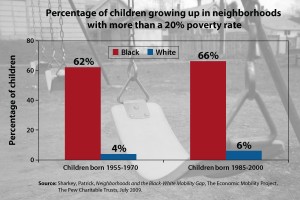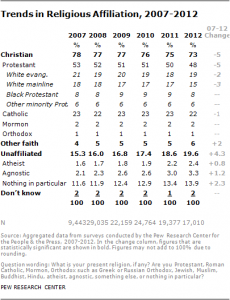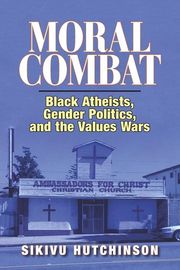It is easy to forget a blight affecting a significant part of humanity, if you are among the lucky ones escaping it. Most of us have an idea of racial inequality in the US today, and how it affects the lives of millions. Nonetheless, for those of us not affected by it, it is something we often overlook. Unfortunately, our oblivion does not change the reality, and this is a reality that, if anything, seems to be getting worse. Look at the following data, from a recent article in the New York Times:
28 percent of African-Americans, and 37 percent of black children, are poor (compared with 10 percent of whites and 13 percent of white children); 13 percent of blacks are unemployed (compared with 7 percent of whites); more than 900,000 black men are in prison; blacks experienced a sharper drop in income since 2007 than any other racial group; black household wealth, which had been disproportionately concentrated in housing, has hit its lowest level in decades; blacks accounted, in 2009, for 44 percent of new H.I.V. infections.
Why would this appear on a blog concerning secularism? Well, the obvious fact that people without belief in the supra-natural should realize that the only one caring for us is each other; that if we do not show compassion for those who are suffering, no gods will (have any gods intervened to ease the starvation in Africa?); that if the lucky ones among us are not affected by this horrifying injustice, it is by mere chance, and if the tables were turned we wouldn’t want others to be blind to what was happening to us. I do not believe that the pioneers of secularism, such as Tom Paine, the author of The Rights of Man and The Age of Reason, would be happy to learn that we look the other way as millions among us suffer.
But there is also another reason this should worry secularists. Look at the data from the recent Pew survey on religion: while the percentage of protestants overall is falling in the US, and both mainline and evangelical protestant groups are shrinking, the black protestant show no change. And as anyone who has attended major atheist/freethought events can attest, racial minorities are decidedly underrepresented among us.
Is there a causal relationship between systemic injustice against minorities, and high levels of religiosity in minority groups? There very well could be. There is ample evidence that security about the future leads to a drop in religiosity over time. It is not hard to see why a community, living nominally in the developed world but in effect subjected to third-world living conditions, will show levels of religiosity more typical of third world nations.
The specific case of the link between socioeconomic status and religiosity among African Americans is discussed by the author Sikivu Hutchinson, is her book, Moral Combat: Black Atheists, Gender Politics, and the Values Wars. In this books, she explains how turning to churches, in communities lacking any real economic prospects, becomes the norm, and how store-front churches mushroom in communities where there are few employment opportunities.
Despite growth in recent years in groups such as African Americans for Humanism, my concern is that failing to pay enough attention to issues of racial inequality and discrimination can, in the long run, result in secularism being a movement without diversity, in a society that is becoming more diverse every day. We wouldn’t want our movement to mirror the ethnic makeup of the Tea Party.



